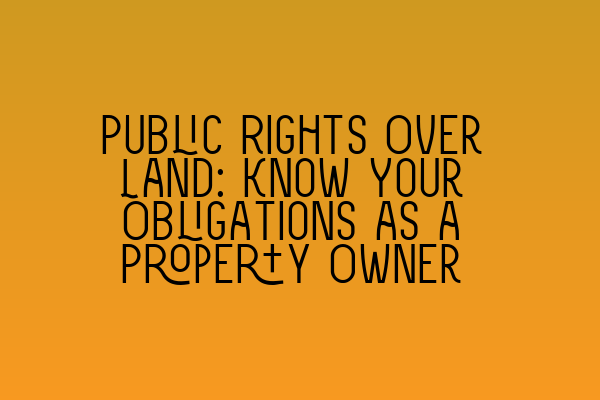As a property owner, it is essential to understand your obligations when it comes to public rights over land. Public rights over land refer to the rights that individuals have to access and use certain areas of land, even if they do not own the land themselves. These rights can have significant implications for property owners, and it is crucial to be aware of your responsibilities to maintain legal compliance and ensure a harmonious relationship with the public.
Understanding public rights over land can be complex, but by familiarizing yourself with the basics, you can navigate these obligations with confidence. In this article, we will cover the key points every property owner should know about public rights over land.
What Are Public Rights Over Land?
Public rights over land are legal rights granted to the general public, allowing them to use or access specific areas of land. These rights can include:
- Right of way: The right to pass through or over a particular piece of land. This may be on foot, by vehicle, or other means.
- Right to access: The right to enter and exit a property via a particular route.
- Right to use: The right to use certain areas of land for recreational activities, such as walking, picnicking, or fishing.
- Right to water: The right to access and use water sources, such as rivers or lakes, for activities like boating or swimming.
It is important to note that public rights over land are not absolute and can be subject to specific limitations or conditions. For instance, the right to access a property may be restricted to certain hours of the day or require individuals to stay on designated paths.
Obligations as a Property Owner
As a property owner, you have certain obligations when it comes to public rights over land. These obligations are in place to ensure the safety and enjoyment of both the public and the property owner. Here are some key obligations to keep in mind:
1. Maintain Safe Passages
One of your primary responsibilities as a property owner is to maintain safe and accessible routes for the public to exercise their rights. This includes ensuring pathways are clear of hazards, such as fallen trees or overgrown vegetation, and providing proper signage or directions when necessary.
Regular inspections of potential hazards and prompt action to rectify them are crucial to prevent accidents and potential legal issues. Additionally, maintaining clear boundaries and markers can help guide individuals and prevent unintentional trespassing on private areas of your property.
If you are unsure of your responsibilities regarding maintaining safe passages, it is advisable to consult with a property law solicitor who can provide guidance specific to your situation.
2. Respect Boundaries and Restrictions
While property owners have the right to limit or regulate public access to their land, it is essential to do so within the boundaries of the law. Any restrictions placed on public rights over land should be reasonable and properly communicated, usually through clear signage or notices.
There may be instances where restrictions are necessary, such as during construction work or for wildlife conservation purposes. However, it is important to ensure that any limitations placed on public access comply with relevant legislation and are not unduly restrictive.
A solicitor specializing in property law can provide advice on establishing reasonable restrictions and help you navigate potential legal concerns.
3. Seek Legal Advice on Disputes
In some situations, disputes may arise between property owners and members of the public regarding public rights over land. These disputes can range from disagreements over access rights to concerns about the misuse of public areas.
When faced with a dispute, it is recommended that you seek legal advice to understand your options and potential courses of action. A property law solicitor can offer insight into relevant laws and regulations, help you negotiate with the other party, or represent your interests in court if necessary.
Addressing disputes promptly and professionally is crucial to maintain positive relationships with the public and protect your rights as a property owner.
Conclusion
Understanding your obligations as a property owner regarding public rights over land is essential for legal compliance and maintaining harmonious relationships with the public. By maintaining safe passages, respecting boundaries and restrictions, and seeking legal advice when needed, you can confidently navigate public rights over land and ensure that both your rights and the rights of the public are respected.
For further guidance on property law matters or preparing for the SQE exams, you can explore the following resources:
- SQE 1 Practice Exam Questions
- SQE 1 Practice Mocks FLK1 FLK2
- SQE 2 Preparation Courses
- SQE 1 Preparation Courses
- SRA SQE Exam Dates
By staying informed and seeking expert advice, you can successfully navigate the complexities of public rights over land and ensure a positive experience for both yourself and the public.
